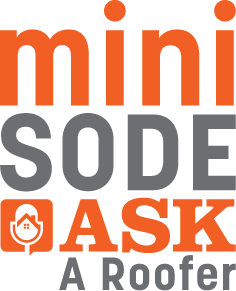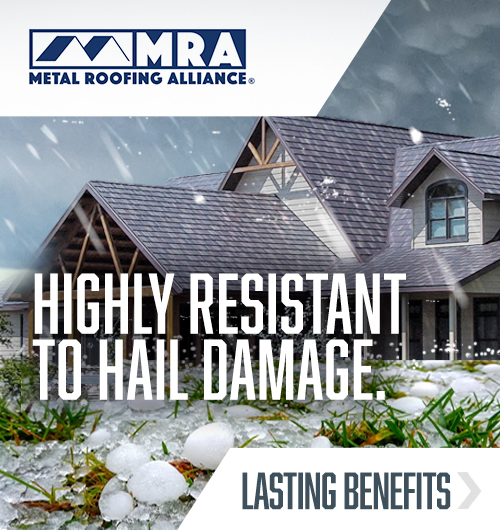Common Commercial Roofing Materials - PODCAST TRANSCRIPT
September 27, 2024 at 12:00 p.m.Editor's note: The following is the transcript of a live interview with Katie Clymerr of Armored Roofing. You can read the interview below or listen to the podcast.
Intro: Hello, everyone. My name is Megan Ellsworth. Welcome back to an AskARoofer mini-sode. I'm so excited. Today we have Katie here, and we're going to be talking about commercial roof materials explained. The 101 of commercial roofing.
Megan Ellsworth: So, hello, Katie, how are you?
Katie Clymer: I'm good. How are you, Megan?
Megan Ellsworth: I'm so good. Excited to see you and have you back on the pod. We've done so many of these recently.
Katie Clymer: Well, I'm glad to be back. I love RoofersCoffeeShop, so it's awesome to be here.
Megan Ellsworth: Yay. Thank you. So can you just tell us a little bit about you and your company, Armored Roofing and then we'll dive into the question?
Katie Clymer: Absolutely. My name is Katie Koetter Clymer. I am president of Armored Roofing company here in Wichita Falls, Texas. We have been in business for 69 years this year, and we have been in this location for, God, forever. I've been in the roofing business for 13 years now, and I'm on the board of RCAT, which is Roofing Contractors Association of Texas and I'm also a member of the National Women in Roofing.
Megan Ellsworth: Amazing. Excited to see you at RCAT coming up in September.
Katie Clymer: Yes, I'm so excited. We just had our summer retreat this last week, and it was awesome. We're recharged, ready to keep going. And we were just talking about the trade show coming up and how exciting it's going to be, and it's going to be jam-packed full of events.
Megan Ellsworth: Yay! Ooh, I'm looking forward to it.
Katie Clymer: Yeah.
Megan Ellsworth: Okay. So commercial roofs, they're big, they're daunting. What are the most common roofing materials that you see on a commercial roof?
Katie Clymer: So we are in Texas, of course, in southern United States. A lot of the materials that we see mainly are single-ply membrane systems, which is TPO, PVC roofs. We see built-up, we see EPDM.
Katie Clymer: A lot of companies are getting away from hot-applied roofs these days. We see some ballasted roofs, just depends how old the building is and if the roof has been updated to the current things and trends that are going on. But normally here we are seeing either... And there's also gravel as well, which is built up. We see gravel or we see TPO, or PVC. Those are kind of the main three that we see in this area.
Megan Ellsworth: Now, between those main three, what are the key differences protection-wise and also just makeup?
Katie Clymer: Yeah, so protection-wise, they offer different things. So the built-up has a hot asphalt ply with gravel, and then you've got your TPO, which has got some type of, I mean, they all have insulation underneath them. It also depends on your deck, and what type of deck is on the building. So we always want to do a sample of an existing roof to see what's there, what type of deck there is, how many layers of roofs, what kinds of roofs were there, so that we know what we're getting into. And at the same time we know what's going to work best for that deck on that roof. There's different options. And then you start from there. So you start with the deck and then you go up to your installation. Does it need to be tapered or not tapered? Do you need to have a cover board or not?
Katie Clymer: And then you kind of go into, "Okay, how are we going to fasten this system?" And that's mainly for our single-plys, single-ply systems. How are we going to fasten this system? Are we going to bond it? Are we going to fasten it, mechanically attached?
Katie Clymer: And then we go into what's going to work best for this. So PVC works best on restaurants, things that hold water or have fat solubles like exhaust fans. Because PVC is a cured product, whereas TPO is an uncured product and so it doesn't work that well on those type of businesses. So we would always stay away from TPO on restaurants especially, because they're going to have those exhaust fans with all of the grease coming off and that TPO is not going to hold up. We also don't really want to put a gravel roof on that either, because gravel's not going to keep it... It's not going to stay clean, it's not going to hold up to all of that that's going on. So it just depends on the type of building that they have.
Katie Clymer: If they have a lot of different penetrations, or curbs or things like that, then it may be something that we want to look at and see, okay, is this... Is A system better than B system? And it's not a one size fits all. And that's where we come in and we take a look.
Katie Clymer: We're not, so a lot of companies and I say a lot, but we have noticed that a good amount of companies don't actually go on site anymore to do inspections or [inaudible 00:04:52]. We are old school in that way.
Megan Ellsworth: Oh.
Katie Clymer: Yeah. They will do a digital view from Google Earth or whatever.
Megan Ellsworth: Got it.
Katie Clymer: Or any software company, that they can find that does those measurings for them. The downfall to those, is that you don't actually get to see what's there. You don't get to do a test, you don't get to see what the deck looks like. And sometimes it's misleading. The measurements are great.
Megan Ellsworth: I can imagine.
Katie Clymer: But the measurements are great, but sometimes it's misleading. And you get there and you're like, "Wow, I didn't see that on that." And so we are always going to go and see the actual building first before we give an estimate. Because there's things that you may not see on a report that you see when you get there and you're like, "Oh man, this is going to cost me a lot of money. I should really put eyes on it first." And that's an old school method, but don't knock it if it's still working, right? And it's kept us from making huge mistakes, and missing huge things that we wouldn't have seen otherwise if we hadn't gone there.
Katie Clymer: Sometimes that means we have to take a trip two and a half hours away. But it's worth it to see what we've put our eyes and hands on what we've got there.
Katie Clymer: It's fun to... I say fun, roofing's fun for me.
Megan Ellsworth: It's fun. It is fun.
Katie Clymer: It is fun. It is fun for me to still continue to learn different things every day. Just this morning I was learning. I was out on a roof an hour away, and I was sitting there and my guys were explaining something new. I was like, "You know what? I learned something new today." And I told them, I said, "Don't ever stop learning. Don't ever stop trying to learn. Because if you do, then what are you doing?"
Megan Ellsworth: Exactly.
Katie Clymer: So even with me in the position I'm in and being here for so long, I still learn every day and I still want to because I just don't see why not. I mean, if I want to learn everything there is to learn and still more. So that's the fun part about doing this.
Megan Ellsworth: Absolutely.
Katie Clymer: You got to make it fun somewhere, right?
Megan Ellsworth: I love that. Yeah, you have to make it fun. And I just love because also a home or building owner wants to hire someone that feels passionate about what they do, and passionate about protecting their property. So I love that.
Katie Clymer: Absolutely.
Megan Ellsworth: Exactly.
Katie Clymer: Yeah. I treat every property like it's mine.
Megan Ellsworth: As you should. I love that. And that's what every customer wants, right?
Megan Ellsworth: So any other factors building owners should consider when they're choosing their roofing material for a commercial property?
Katie Clymer: A lot of the times when we come into a property or a project, the architects have already chosen what type of materials they're going to use. They've specified that they're only wanting ABC companies. And then so I think the owner has a little bit of say in that, as far as what type of system they would like. But a lot of the single ply, I'll talk about the single ply, a lot of the single ply companies are, they're all pretty much even keel. There's not a big difference between one or the other. There's our personal favorites that we like to use, but then they all have the same type of products, the majority of them do.
Katie Clymer: So just really know your roofer. Make sure that your roofer is licensed, if your state has licensing. Find out if your state has licensing. Make sure that they have the insurance to cover if something should happen. Make sure that they have references, make sure that they have some credentials somewhere, something, whether it be with the city, with the state, with the BBB. Anywhere. See that they've been around for a while, and if you can visit their office.
Katie Clymer: Contact their office. Don't just contact a cell phone, but contact an office and see if you get an automated answering or you get an actual person or if you can talk to anybody on the phone through an office line. Those are just basic things that we try to push with commercial owners just to let them know, "Hey, we're here, but even if it's not us, it's going to help you. Here's some things to help you find the right fit for you."
Megan Ellsworth: Absolutely. Absolutely. Well, Katie, thank you so much.
Megan Ellsworth: Everyone out there in the Wichita Falls area go, please contact Armored Roofing if you're in need of any roof repairs or a new roof altogether, they will take care of you. And thanks everyone for listening.
Megan Ellsworth: Katie, I'll see you next time on the next mini-sode.
Outro: Awesome. Thank you so much, Megan.











Comments
Leave a Reply
Have an account? Login to leave a comment!
Sign In